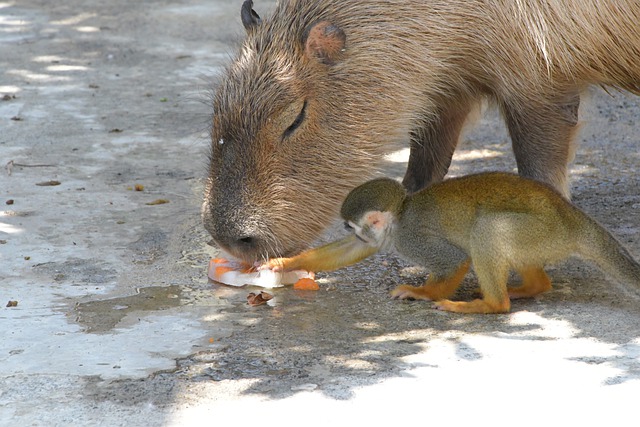Is A Capybara Dangerous: Unveiling Truths You Must Know
Have you ever wondered if a capybara is dangerous? These large, gentle rodents often look calm and friendly, but you might still ask yourself, “Could they actually harm me?”
Understanding their behavior is key to knowing what to expect if you ever come across one. You’ll discover the truth about capybaras and their nature—so you can feel confident and safe whether you meet one in the wild, at a zoo, or even as a pet.
Keep reading to uncover surprising facts that will change how you see these unique creatures.
Credit: www.quora.com
Capybara Behavior Traits
Capybaras have unique behavior traits that make them interesting animals. They live in groups and enjoy social interactions. Understanding how they act helps us see if they are dangerous or not. Their behavior shows they are mostly calm and gentle creatures.
Observing capybaras closely reveals how they behave around others, including humans. They have clear ways of communicating and reacting to their environment. These traits give important clues about their nature.
Social Nature
Capybaras are very social animals. They live in groups of 10 to 20 members. They spend time grooming each other to build bonds. This shows they like being close to others. Group living helps them feel safe and secure. They also share food and water sources. Their peaceful group life means they avoid fights and danger.
Typical Reactions To Humans
Capybaras usually stay calm around people. They can be curious but not aggressive. If they feel scared, they run away quickly. They rarely show signs of anger or attack. Sometimes, they allow gentle petting. Sudden loud noises or fast movements may startle them. Respecting their space keeps interactions safe and pleasant.
Potential Risks Around Capybaras
Capybaras are generally calm animals but can pose some risks. Understanding these risks helps keep both humans and animals safe. The main concerns include bites, scratches, and disease transmission. Knowing these dangers can prepare you for safe encounters.
Biting And Scratching Incidents
Capybaras have strong teeth and sharp claws. They may bite or scratch if they feel scared or threatened. These injuries can cause pain and infection. It is important to avoid sudden moves or loud noises near them. Always approach capybaras calmly and with care.
Disease Transmission Concerns
Capybaras can carry germs that affect humans. They may carry parasites like ticks or fleas. These parasites can spread diseases such as Lyme disease. Contact with their urine or feces can also pose health risks. Washing hands after touching capybaras reduces these risks. Keeping a safe distance helps prevent illness.
Capybaras As Pets
Capybaras are large rodents known for their gentle nature. Many people wonder if they make good pets. Understanding their needs helps decide if they fit well in a home. They need space, water, and social interaction to thrive. This section looks at their life as pets and how to keep them safe.
Suitability For Domestic Life
Capybaras need plenty of space to move around. They enjoy swimming, so access to water is important. These animals are social and prefer living with other capybaras. They do not like being alone for long. Their diet includes grasses and vegetables, requiring fresh food daily. Capybaras can adapt to home life but need special care. They are not like typical small pets such as cats or dogs.
Safety Precautions For Owners
Capybaras are usually calm but can bite if scared. It is important to handle them gently and calmly. Children should be supervised around capybaras to avoid accidents. Owners must provide clean water and a safe environment. Regular veterinary care keeps capybaras healthy. They can carry diseases, so hygiene is key. Knowing their behavior helps prevent injuries and stress.

Credit: capybarafacts.com
Wild Capybaras Vs. Captive Capybaras
Capybaras live in two very different worlds: the wild and captivity. Their behavior changes a lot depending on their environment. Wild capybaras face natural dangers and must stay alert. Captive capybaras live in safer, controlled spaces. This affects how they act and how risky they can be to humans.
Behavioral Differences
Wild capybaras are shy and cautious. They stay in groups to protect themselves. They avoid humans and run away if threatened. Their behavior is shaped by survival needs.
Captive capybaras get used to people. They often become calm and friendly. They may approach humans for food or attention. Their safety and regular care make them less scared.
Interaction Risks
Wild capybaras can bite or scratch if scared. They see humans as threats. Approaching them closely is dangerous and stressful for the animal.
Captive capybaras are less likely to harm people. Still, they can bite if startled or annoyed. Respecting their space is important to avoid accidents.
Signs Of Aggression In Capybaras
Capybaras are usually calm and gentle animals. They live in groups and enjoy being around others. Despite their friendly nature, capybaras can show signs of aggression. Knowing these signs helps keep both you and the animal safe.
Recognizing when a capybara feels threatened or upset can prevent problems. Their body language and sounds often tell a clear story. Being aware of these signals is important for anyone near them.
Warning Signals To Watch
Capybaras may growl or bark to warn you. They raise their fur to look bigger. Their teeth might show if they feel angry. Sudden movements or loud noises can make them tense. They may also stomp their feet to scare off threats.
Avoid staring directly at their eyes. It can seem like a challenge. Watch for tail flicks or head shaking. These small signs show irritation. Pay attention to how close they let you get.
How To Avoid Provoking Aggression
Move slowly and speak softly around capybaras. Do not reach out suddenly or grab them. Give them space to feel safe. Avoid loud sounds that might startle them. Respect their resting and eating times.
Offer food gently without forcing it. Let the capybara come to you first. Keep pets and children calm near them. Always watch their behavior closely for changes. This way, you can enjoy their company peacefully.
Benefits Of Capybara Interaction
Capybaras are gentle animals that offer many benefits through interaction. Spending time with them can bring joy and calmness. People often find comfort and happiness around these friendly creatures.
Capybaras have a unique way of connecting with humans. Their calm nature helps reduce stress and improve mood. These benefits make capybaras great companions for many people.
Therapeutic Effects
Capybaras have a soothing presence. Their calm behavior helps lower anxiety and stress levels. Many people feel peaceful around them. Touching or petting a capybara can release happy feelings. This interaction can help improve mental health. It works well for people feeling lonely or worried. Capybaras’ gentle nature supports emotional healing.
Educational Opportunities
Capybaras teach us about nature and animal care. Observing their habits helps us learn about wildlife. They show how animals live and behave in groups. Children enjoy watching and caring for capybaras. This experience encourages respect for animals. It also raises awareness about protecting nature. Capybaras make learning fun and meaningful.

Credit: a-z-animals.com
How Smart Pets Lover Can Help You with Is A Capybara Dangerous
Learning From Capybara Behavior and Safety Insights
Understanding whether a capybara is dangerous goes beyond simple curiosity—it opens doors to meaningful learning about animal behavior and responsible pet care. By observing capybara behavior traits and recognizing signs of aggression, pet lovers can better appreciate these gentle giants and their unique communication styles.
For anyone considering capybaras as pets, distinguishing between wild capybaras and captive capybaras offers practical insights into their needs and temperament. This knowledge helps foster safer interactions, ensuring both human and animal feel secure and understood.
- Watch for subtle body language cues to prevent potential risks around capybaras.
- Use these observations to build trust, enriching your experience with these social creatures.
- Share what you learn with fellow pet parents to promote informed, confident pet ownership.
At Smart Pets Lover, we believe every interaction teaches us something valuable about our animal companions. If you want to dive deeper or have questions, reaching out to local wildlife experts or animal behaviorists can be a great next step. Remember, learning is part of the joy in every wag, purr, and chirp—and yes, even in every squeak of a capybara!
Frequently Asked Questions
Are Capybaras Aggressive Towards Humans?
Capybaras are generally gentle and shy animals. They rarely show aggression unless threatened or cornered. With proper care, they can be friendly pets.
Can Capybaras Bite Or Harm People?
Capybaras have strong teeth but usually do not bite unless provoked. They may nip if scared or startled, but serious harm is rare.
Do Capybaras Pose Danger To Other Pets?
Capybaras are social and peaceful, often coexisting well with other animals. They rarely show dominance or aggression towards pets in the same environment.
What Should I Know About Capybara Behavior?
Capybaras are calm, social, and prefer to live in groups. They communicate through whistles and barks and enjoy water activities.
Conclusion
Capybaras are usually gentle and calm animals. They rarely show aggression toward humans. Still, they are wild creatures and can bite if scared. Respect their space and avoid sudden moves. These animals live peacefully in groups and enjoy water. Understanding their behavior helps keep you safe around them.
They are not dangerous pets but require care. Learning about capybaras makes meeting them less risky. Treat them kindly, and they will not harm you.






